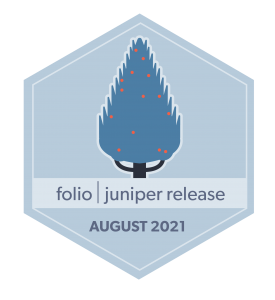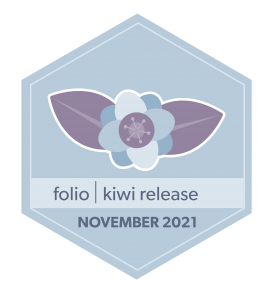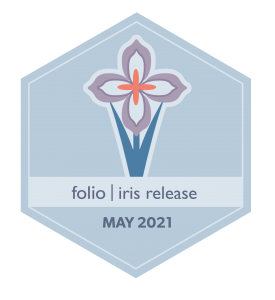Home » 2021
Yearly Archives: 2021
FOLIO@Duke Newsletter v. 3 no. 3
Local Project Updates
Data Clean Up Project – As mentioned in the last newsletter, we’re focusing on our data this fiscal year. The Metadata and Discovery Services section and Library Systems and Integration Support department (LSIS) have worked together to define and script an extract of our data to sent to OCLC. OCLC will sync our title and holdings data and theirs, a process previously called reclamation.

Work on importing data into FOLIO continues with loading of closed order records. We’re also negotiating through feels and fines and requirements about any retention of those historical records.
The Juniper release was installed on our development server last week. LSIS and our stakeholders will validate the upgraded data and check our current workflows over the coming few weeks. There are some new features that will be important to the Courses app included in this release. Full release notes are available on the FOLIO wiki.
International Project Updates
Kiwi is on schedule to be released at the end of November. Kiwi introduces a new search algorithm, Elastic Search, in the Inventory module. Elastic Search will allow for faster retrieval of record sets and accurate counts of those record sets to be displayed. The previous search configuration gave estimated numbers in the result sets. With this switch to Elastic Search, facets for narrowing the results list will require more work and will be available again in a forthcoming release. Also coming in Kiwi is MARC holdings. Duke relies on MARC holdings, and it will be great
Search will allow for faster retrieval of record sets and accurate counts of those record sets to be displayed. The previous search configuration gave estimated numbers in the result sets. With this switch to Elastic Search, facets for narrowing the results list will require more work and will be available again in a forthcoming release. Also coming in Kiwi is MARC holdings. Duke relies on MARC holdings, and it will be great
Watch This!
For an update on our project plans for the remainder of this fiscal year, please view the slide deck linked below.
Bee Facts
It’s getting to be that time of year again, and now that we’re out and about more this fall, it’s likely some of us will come down with a cold. Honey and Lemon tea is an age-old recipe to help with sore throats.
FOLIO@Duke Newsletter v. 3 no. 2
Courses and Inventory apps live in production!
by Erin Nettifee
In June 2021, a small team launched Course Reserves in FOLIO, marking the second FOLIO functional area to “go live” in advance of our full launch in 2022.
The project began in Summer 2020 when Mark Deutsch, former senior developer in LSIS, developed an LTI edge module for FOLIO. LTI stands for Learning Tools Interoperability, and is a common development standard for outside apps and tools to talk to learning management systems like Sakai, which Duke uses to support online courses. Chris Lorch in Learning Innovation helped to create an LTI tool in Sakai that used Mark’s new functionality to course materials on reserve automatically to students in their course in Sakai, along with the rest of their course content. That way students know which items the library has (electronic or print) that they can access for their coursework, potentially saving them hundreds of dollars.
In January 2021, a small group of Resource Access staff members – Jeremy Martin (Perkins), Andrea Loigman (Perkins,) Sarah Griffin (Music), and James Britt (Law) – came together with LSIS to carry out a project to deploy Courses for Duke in Summer 2021. With a long list of tasks to accomplish, the group met weekly to do things like learn how the Courses app works, develop new processes for putting items on reserve in FOLIO, and decide what data needed to be migrated from Aleph to Courses. While the group was focused on those tasks, Mark continued helping the project by migrating course information from Aleph into FOLIO, while Jeff Fleming worked on migrating Duke bibs, holdings, and items into our production instance of FOLIO so that they could be put on reserve when we went live.
With all members of the team involved, we were able to go live in mid-June, allowing staff at Perkins Library to support any summer term 2 courses and be ready to begin support for fall courses when faculty requests for course materials start coming in. The East Campus Libraries will join the Reserves effort in Fall 2021, and we look forward to supporting other interested schools after we go fully live on FOLIO in Summer 2022.
In addition to Courses going live this summer, we took on the project of updating the Top Textbooks page to use the FOLIO Courses data and to update the back end software used for that page. For the Top Textbooks program, the libraries purchases the titles for the 100 most enrolled classes at Duke, allowing students easier access to their course materials. Early in the pandemic, we turned off the previous Top Textbooks page that had been running on Simile. The new version uses Airtable. Many thanks to the Resource Access staff listed above for their work on updating the FOLIO data, and to Erin Nettifee and Angela Zoss for their work on developing and testing the resulting web page.
Local Timeline Change
by Karen Newbery
In her August 9, 2021 letter to the DUL staff, Deborah Jakubs announced that our plans to go-live with all of FOLIO in 2022 have been delayed. Our Duke colleagues who have been deeply involved in the FOLIO implementation have ranked over 275 features out of all the FOLIO features that we consider critical to our implementation. As Deborah stated, “At this time about 40% of those (275) features have been developed. As a large academic library system with more than 270 staff, over eight million bibliographic records, thousands of print serials, even more electronic resources, and 275,000 circulation transactions per year, we must be able to count on a platform that is able to handle our work with speed and accuracy at scale…Our commitment to FOLIO is strong, and we will continue to implement incrementally as core modules and applications are ready and fully meet our requirements for productivity. We will continue to prioritize our commitment to providing subject matter expertise, product ownership, and contributions to software development in order to make FOLIO the library services platform that libraries of the complexity of Duke’s need. On behalf of EG and the larger FOLIO leadership community, thank you very much for all your contributions to the success of this promising new platform.”
The Library Services Platform Steering Group met on September 13, and discussed plans for FOLIO work in the fall and Library Data Cleanup Project. The FOLIO implementation will directly benefit from this project and we need to adjust our plans to allow members of our implementation teams and working groups to work on the Cleanup Project. Over this fall, work will be done to finish loading data and configure local permission sets so we can adjust our focus to testing new releases as they come out.
International Project Updates
Cornell University implemented all of FOLIO this summer! The first of our peer libraries to go live with all of FOLIO. They’ve shared that things are going well. They had many processes that had not been automated for their old system, which made it easier to switch to FOLIO than some other universities. Texas A&M and the University of Chicago had planned to launch FOLIO this summer, but decided to hold off. TAMU found some issues integrating with their VuFind discovery layer, and Chicago found various automations that individual departments were doing on their own with Access data bases and linking directly to their underlying OLE data. It’s going to take more time to account for those issues.
Watch This
If you’re interested in some behind-the-scenes technical work, check out the Sprint Reviews. In these forums, developers and product owners demonstrate work that has been completed over the past two weeks.
Bee Facts
The seasons are changing. Why is fall a busy time for bees?
FOLIO@Duke Newsletter v. 3 no. 1
Iris Release

The FOLIO community announced the first release of 2021, Iris, on Friday, April 30th. Iris introduces a new app for the integration of the remote storage product, Demantic, which is used by University of Chicago for their remote storage. This is a first step to integrating Duke’s remote storage software, CaiaSoft. Also included in Iris is support for EDIFACT invoices, and integration with OCLC’s Connexion software. The Single Record Import integration using Connexion was developed by our hosting partner, Index Data, and was supported by Duke, the University of Chicago, and Cornell. You can find more details in the Iris Release Notes.
Local Project Updates
Data Migration from Aleph to FOLIO continues. We’ve been able to test the migration of budgets and orders recently. We are working on how to provide the initial allocation for the budgets. The daily patron loader we use in Aleph is now running in our FOLIO test instance, and we’ll be migrating existing Aleph-only patrons such as Friends of the Library, guests, etc. this summer. A fresh load of bibliographic, holdings, and items from Aleph to our test server was run the week of May 10th so that we can make final configurations and do training on the Courses app, which we’ll be launching in just a few weeks!
The Training Development and Delivery Team has hosted the first two sessions of the Introduction to FOLIO: Searching, Filtering, and Navigation course to designated superusers. Initial responses were positive to the course, so we’ll continue developing courses as laid out by our draft course curriculum. We can’t wait to share the training with all the staff!

We spent the month of April working to determine the features we need in the upcoming Kiwi release (on top of all the other FOLIO work!). The community agreed to give each institution 100 points to distribute among their highest ranked features. In the FOLIO issue tracker (using Jira), each institution ranks each feature on a scale from one to five, with one being the most important. Duke currently has around 250 rank one features. Our project manager reviewed each of the 250 features and noted the highest priority of those. Our implementation teams then reviewed the features in their area and narrowed the list down to a total of about 25. We distributed our 100 points among those and reported them to the community ballot. The community Capacity Planning Team will then take the highest ranked features and work to assign development teams and product owners to develop those features and include them in the Kiwi release.
The Kiwi release is important to Duke because that’s the release on which we’ll base our training curriculum and use for training staff.
International Project Updates
Along with the Kiwi pointing process, the community has been working to implement a new governance model. We’ve had a Product Council and a Technical Council over the years, and they have shepherded the functional and technical development respectively. We’ve recently added a Community Council which will focus on building the community, handling the budget, and manage elections for the Product and Technical Councils. Duke’s Dracine Hodges, Associate University Librarian for Technical Services, was elected to the Community Council. Voting for the Product and Technical Councils will take place this summer.
Two of our peer institutions are planning to go live this summer, Texas A&M, and Cornell. The University of Chicago is launching the ERM-focused apps, and plans to launch a full FOLIO implementation later this year. Having these large research institutions live on FOLIO is a great test for the product, and Duke will be able to learn a lot from their implementations. The community’s Implementer’s Group meets every week to discuss features and issues that affect implementation, share demonstrations, and welcome the Capacity Planning Team to share the work they’re doing on each release.
The community Special Interest Groups have been working on documentation over the last few months. The result is a new documentation portal which houses general user documentation for FOLIO. Duke will be developing documentation for our local workflows, and this documentation portal is a great place to start to understand how FOLIO workflows were designed.
Watch This
The community’s Reporting Special Interest Group presented recently on reporting with the Library Data Platform. They introduced a new reporting app that is linked to the LDP and will allow users to be able to view reporting data quickly and through the FOLIO interface. Duke staff will recognize Angela Zoss, who is now convening the Reporting SIG.
Bee Facts
Looking to reduce the use of plastic for your food storage? Consider using a beeswax wrap instead of plastic wrap or plastic bags. Wraps are available commercially or can be made yourself.
Introducing the FOLIO Training Development and Delivery Team
Our transition to FOLIO is planned for summer of 2022, and it’s time to start thinking about staff training! Today, we’re going to share what has been happening behind the scenes to make sure all staff at Duke Libraries feel comfortable transitioning their work to FOLIO.
Building training infrastructure
Beginning in early 2020, a series of FOLIO Implementation Teams and Working Groups spun up at Duke to begin coordinating efforts around the FOLIO transition. The Documentation and Training Working Group was charged with establishing best practices and support materials for FOLIO-related documentation and training. The DTWG met through the first half of 2020 and created a series of resources to guide the development and delivery of documentation and training (Duke login required):
- Documentation Guidelines and Toolkit
- Training Methods Toolkit
- Glossary of Terms and Acronyms
- Translation Guides from Aleph to FOLIO
With this infrastructure ready, the task became to establish a group to oversee the development of training content.
Building training content
What kind of team would be needed to build training materials that cover all needed FOLIO functionality, acknowledging that current FOLIO team members are already heavily committed? A small group began meeting in the fall of 2020 to discuss possible training development models. The options considered included separate training teams for different groups of FOLIO apps and a small core team with rotating experts to help in different content areas. In the end, the small group proposed staying a small group – a newly formed Training Development and Delivery Team, made up of Karen Newbery, Julie Brannon, and Angela Zoss.
Our training philosophy includes several goals:
- Focus on specific user needs
- Focus on understanding patterns, not memorizing steps
- Use a consistent style for materials
- Use consistent terminology across courses
- Use consistent delivery mechanism
One benefit of this small team is the ability to build high levels of skill among the small group and devote a high level of attention and time to the training program. One of the gaps, though, is the inclusion of deep expertise in all areas of FOLIO. To leverage expertise across the libraries without requesting full team membership, the TDDT has created a training role of “superuser.”
Learning from our superusers
The TDDT training staffing proposal describes our concept of superusers, or staff members who will be offering feedback on draft versions of the FOLIO training modules. These superusers will be part of an iterative training design model. The TDDT will design training modules based on their understanding of FOLIO apps features and staff needs determined by the FOLIO Implementation Teams. Superusers across the different divisions and libraries at Duke will test out the training materials by attending a live demonstration or reviewing recordings or text-based versions of the same material. Superusers will then give feedback on the materials, including feedback on the style of the materials and the content covered in the module. TDDT members will revise the materials and request further feedback as needed.
The development of training materials will be scheduled according to a variety of criteria, including how busy the superusers are for a particular module and how stable the development is in a particular FOLIO app. This allows us to stagger the requests for feedback across different groups of superusers. The expectation is that superusers will be spending short amounts of time periodically through the summer and fall of 2021 to review modules that are directly relevant to their positions. The result of this early training will also position superusers well to serve as local experts when other staff if their sections or departments begin their training toward the end of 2021.
Planning course pathways
One of the early tasks of the TDDT is to review and refine a draft course curriculum, used to plan out what modules are needed and what course pathways make sense for staff with different roles in the libraries. The curriculum can help staff consider what course modules are likely to be relevant to their current positions and to plan training time accordingly. Staff in roles that currently use Aleph should expect to undertake FOLIO training in any related areas. Even staff who do not currently use Aleph may wish to review the course curriculum; FOLIO has new features that weren’t available in Aleph, and you may be curious to learn a bit about what is possible.
As we all set up our annual goals for the coming year, we encourage staff to reserve time for FOLIO training, either as a superuser or as part of the wider staff training rollout. Please contact us with any questions or suggestions!
